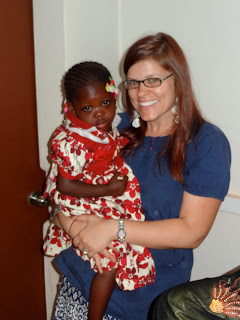Tea is a major part of Malian culture and it is hard to go through a day without several different "tea times". You will not find fresh coffee in Mali, only tea. I have been on a quest this trip to discover the process of making perfect Malian tea. I bought a traditional tea pot in the market and then was gifted the small coal burner. After getting some green tea today and small shot glasses (used for multiple steps in the process), it was time to try it for the first time.
The teapot goes right on top of the coals and gets extremely hot very quickly. The pros can swing the charcoal burner around 365 degrees at a time to get air to the coals and increase the heat.
Once the tea has steeped it is time for the process of adding the sugar and then starting the pouring steps that involve pouring from as high as you can to produce a "head" on the tea like you would expect in a good beer. You pour into the glass, then back into the the pot, then repeat multiple times to mix in the sugar.
The youngest MacLean, Silas, was a big help with the sugar.... some for me, some for the tea!
Updated photo of the tennis court, now 1/4 finished and moving on a typical Malian pace.
Tonight we had dinner with one of Brett's pediatric nurses Esaie. On the way to dinner, we stopped to pay respect to the family of another nurse from the hospital who recently had a death of an elder family member. Paying respects to the family is a very important part of this culture. We visited the family "compound" and went through a complex process of greetings.
Young girls playing in the courtyard. The one on the left wants to be a doctor when she grows up and then one on the right said she wants to move to France. The country has so little, but the children still dream big just like ours.
Greeting the family. Seats are brought out for us to stay a while and talk.
Baby Ruth!
Tonight we had a traditional Malian meal with Esaie and his family. The food was placed on each one of the small tables in a large bowl and then we ate with our hands out of our section of the bowl. The food is really amazing... rice, beef, cabbage, onions, tomatoes. After dinner we sat around the courtyard talking about the day and enjoying the relative "cool" of the night.

























































